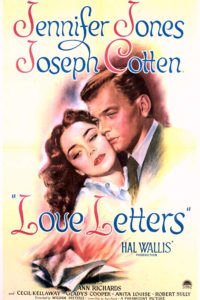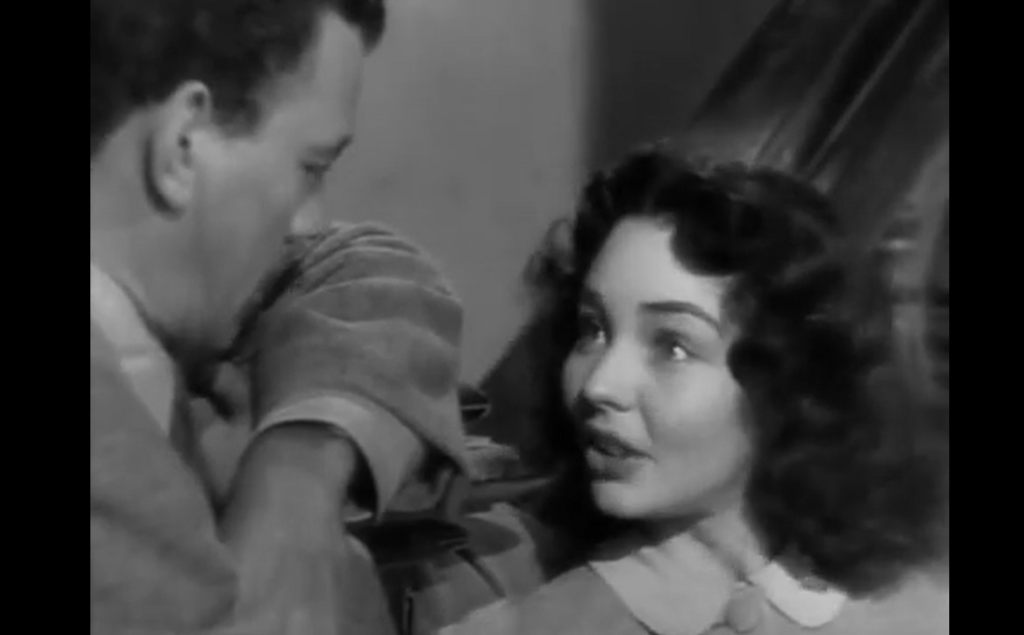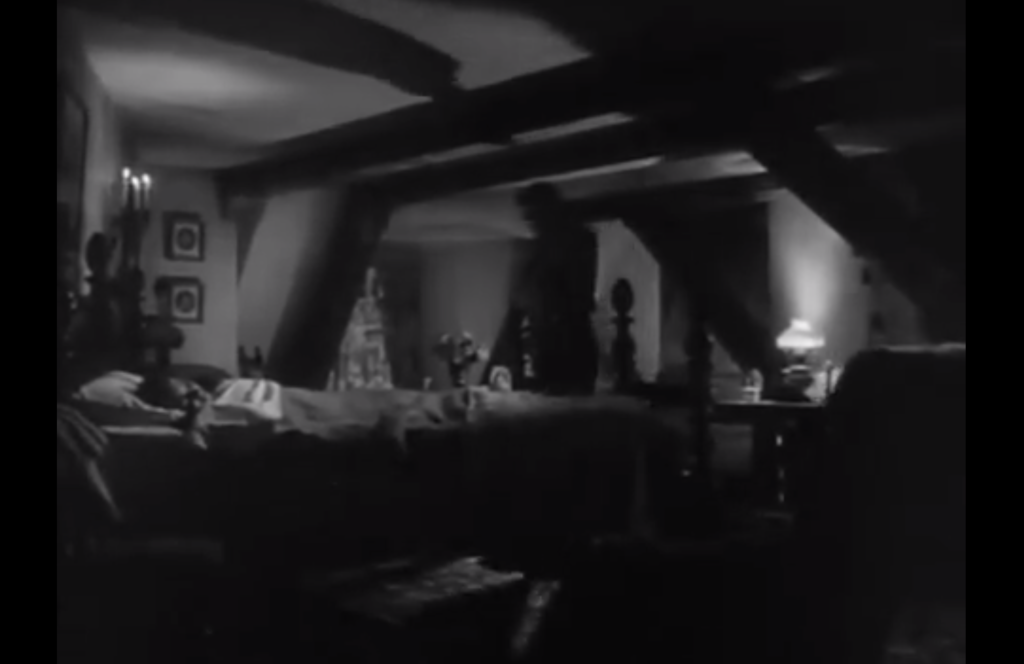“I love you, and I think I’ll always love you — but I must try to remember.”
|

Synopsis:
A soldier (Joseph Cotten) who’s secretly written romantic letters to a woman (Jennifer Jones) on behalf of his friend (Robert Sully) eventually meets Jones after the war, though she now goes by the name “Singleton” (rather than Victoria), is looked after by a caretaker (Ann Richards), and struggles with amnesia after being sent to an asylum for murdering Sully. Cotten and Jones fall in love, but Jones is haunted by his original love for “Victoria”; meanwhile, Cotten live in constant fear that Jones will remember the murder she committed and descend once again into madness.
|
|
Genres:
Review:
Jennifer Jones and Joseph Cotten co-starred in four features together: Since You Went Away (1944), Duel in the Sun (1946), this title (scripted by Ayn Rand!), and Portrait of Jennie (1948). Rand is primarily known for developing a philosophical system entitled Objectivism — in which heroic, productive, reasoning individuals seek their own happiness above all else — but I’m hard-pressed to see much of her interest or influence here. Indeed, this melodramatic romance about amnesia and hidden identities seems to fly in the face of Rand’s philosophical approach to life — except perhaps in the presentation of Cotten’s character as someone determined to be with Jones no matter what, and resolute in his willingness to help her suppress her memories.

Unfortunately, it’s not a very effectively scripted narrative, given that both Cotten and Jones fall in love with individuals sight unseen (Cotten with the recipient of his Cyrano-de-Bergerac-esque letters, Jones with the man she thinks wrote her the letters) — so their entire romance is predicated on other-worldly notions of idealism and transcendent love. Jones’ “Singleton” (what a terrible new name!) might as well be called “Simpleton” given how infantalized her character is, and none of the other characters are particularly well-limned either. We’re left simply waiting for the inevitable moment when a flashback will tell us what really happened to Jones before she lost her memory — and even that pay-off isn’t very satisfying.
Redeeming Qualities and Moments:
- Lee Garmes’ cinematography

Must See?
No; you can skip this one.
Links:
|



One thought on “Love Letters (1945)”
First viewing. Unless you’re in the mood for a bit of a laugh, skip it. As per my post in ‘The ’40s-’50s in Film’ (fb):
Spoilers Galore!… ~but… this is a 75-year-old movie. If you haven’t seen it yet, you don’t seem to be in that much of a hurry, so I feel less guilty.
“It’s no use when others tell you what you don’t really remember.”
‘Love Letters’ (1945): Jennifer Jones and Joseph Cotten are a most unusual pair of lovers in what is among the most convoluted of ‘woman’s pictures’. Though it doesn’t earn the honor of ‘camp classic’, it’s not for want of trying (and, if you ask me, it gets close). Set in its present day as WWII is ending, it tells the tale of a romantic soldier (Cotten) who is talked into the Cyrano-esque task of writing his buddy’s letters to his sweetheart – because the latter claims to not have a way with words.
There’s already a major plot problem: Cotten’s war-chum is a clod; so how does he expect Jones to believe that he can write the kind of syrupy mush that a straight man hasn’t attempted since Percy Bysshe Shelley? Nevertheless, Jones buys in – much to her regret, when her oaf of a husband is eventually sick of hearing her trying to figure out how a poverty-of-feeling spouse could’ve written of such undying love. (Yes, unbelievably, months after her wedding, she’s still trying to put two-and-two together – never mind the fact that all hubby has to do for proof is open his stupid mouth.)
Things escalate quickly, to the dissonant tunes of murder, prison, amnesia. When Cotten gets word that *both* Jones and her husband are dead, he feels responsible – and sets out to find the truth of what happened. Since Cotten and Jones never met, things become confusing when it turns out she isn’t dead (she has a new, odd name), the two meet – and they soon fall in love.
Since Jones is an amnesiac when we first see her, she’s actually rather charming. (Well, kind of.) And even *I* didn’t mind some of her idealistic sentiment: “I think very few people are happy. They wait all their lives for something to happen to them — something great and wonderful. They don’t know what it is but they wait for it. Sometimes it never happens.”
But then the film (with a screenplay by Ayn Rand, of all improbable people) turns to the terror of Jones beginning to get her memory back – leaving her no choice but to begin over-acting (since there is no other way to play the role at that point – and, by the way, she still got an Oscar nom).
Will she remember what happened ‘that terrible night’ – when the murder weapon was found in her hand and her white blouse was covered in blood? Will the truth drive her insane? Or will she finally get over her intense fear of mailmen?, and once again know how to write as well as read? And what about us? Will we try not to notice that her guardian is played by queen bitch Gladys Cooper – who is obviously the murderer?
The one line I was waiting to hear from Jones (to Cooper) never comes: “Wait… you mean I *didn’t* do it?! And I went to PRISON for a YEAR because of YOU?!!” 😉